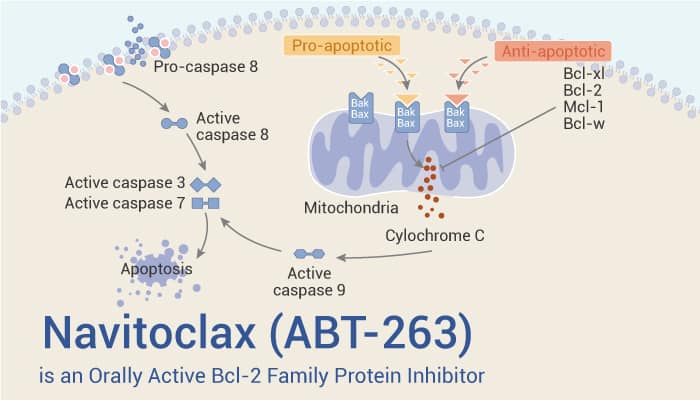Bcl-2 family proteins, known as B-cell lymphoma 2, are regulators of programmed cell death. Additionally, the bcl-2 family includes pro-apoptotic and anti-apoptotic proteins. Anti-apoptotic proteins refer to Bcl-2, Bcl-x (L), Bcl-w, and Mcl-1. They block apoptosis by isolating pro-apoptotic proteins Bax and Bak. Therefore, one of the main methods for cancer cells to escape apoptosis is the up-regulation of anti-apoptotic proteins of the Bcl-2 family. Overexpression of Bcl-2 or Bcl-xL are common in acute lymphoblastic leukemia (ALL) and small cell lung cancer (SCLC). However, the “BH3”-only protein from the Bcl-2 family directly interacts with Bax and Bak to induce apoptosis. The anti-apoptotic Bcl-2 family equips special BH3-binding slots so that BH3 analogs effectively target Bcl-2 proteins to arrest the cell cycle arrest and induce cell death. Here we’ll introduce an oral effective BH3 analog and Bcl-2 inhibitor, Navitoclax (ABT-263). Navitoclax can be widely used in cancer research.

Navitoclax, an orally bioavailable Bcl-2 family inhibitor, induces mitochondria-dependent apoptosis.
In vitro experiments confirmed Navitoclax’s anti-tumor activity. Specfically, it binds to Bcl-xL, Bcl-2, and Bcl-w, with Ki values <1 nM. Thus it (0-1 μM; 48 h) inhibits FL5.12 prolymphocyte cells overexpressing Bcl-xL or Bcl-2 with EC50s of 60 nM and 20 nM, respectively. Moreover, it (0-500 nM; 48 h) disrupts Bcl-xL/Bcl-xS interactions in HeLa cells. Meanwhile it (0.1, 0.5, 2.5 μM; 2 h) induces Bax translocation and cytochrome c release via inhibition of Bcl-2 and Bcl-xL in H146 cells. It (195 nM; 0.5-24 h) also induces the activation of caspase-3 time-dependently. Navitoclax potently recovers IL-3-dependent cell death against Bax/Bak-dependent cells.
Navitoclax has good oral bioactivity in vivo. Based on lipid solvents, Navitoclax shows almost 50% oral activity. It (100 mg/kg; p.o.; once daily for 17 days) induces complete tumor degeneration in the mouse model of AL and SCLC. Moreover, it (2 mg/kg/d for 6 d, then 6 mg/kg/d for 6 d; p.o.) also induces rapid but reversible thrombocytopenia in dogs.
In a word, Navitoclax is a BH3 analog with antitumor activity in vitro and in vivo. It strongly suppresses Bcl-xL, Bcl-2, and Bcl-w and disrupts Bcl-xL/Bcl-xS interactions. It also induces Bax translocation and caspase-3 activation, specifically targeting Bax/ bak-dependent cells.
Reference:
[1] Tse C, et al. Cancer Res. 2008 May 1;68(9):3421-8.
[2]Lock R, et al. Pediatr Blood Cancer. 2008 Jun;50(6):1181-9.